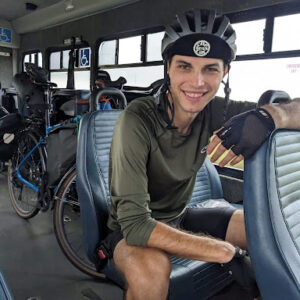 Ian Buck – MFT
Ian Buck – MFT
My name is Ian Buck, and I teach computer science, cybersecurity, and media production, for 10th – 12th graders in Career and Technical Education programs. I teach district-wide across Minneapolis Public Schools and have students at all of the district high schools, which requires me getting around town as efficiently as I can. I am also a member of the Minneapolis Federation of Teachers (MFT).
For me, transit is what I depend on when my bicycle doesn’t cut it. I often use transit in conjunction with my bike to get the best of both. The combination is a sum greater than the parts. I actually chose my neighborhood in Minneapolis so that I’d be able to get to work easily entirely on my bike using off-street trails. The only thing is that Minneapolis gets cold, like very cold, so having a reliable bus that can take me to work is an absolute lifesaver. I teach students at all different high schools, so I might be asked to go somewhere by a student or have to give a cohort more attention, so transit is essential to get me from place to place while also being able to check my emails and do assignment grading on the bus.
The union and district have also ensured that most high schools now give everyone an unlimited bus card, so we actually have students who are getting to school via public transit, which gives us an impetus for ensuring our transit system is usable by everyone. Public transit is also important for my teaching and student learning because, as a teacher of students in all the different high schools, the district doesn’t have the resources to send shuttle buses to every school to pick students up for field trips. But with transit accessibility, I can just tell all students we’re going to meet at a specific location and to show up at a certain time, I send them a screenshot of a bus route to take from their particular school, and then they use their district transit card to get there! It’s great, and I often get to ride the bus with some students on the way back too.
When I was looking to move to Minneapolis from Saint Paul, I wanted to live closer to friends in a certain area and so was specifically job hunting for teaching gigs that were either entirely remote or were in Minneapolis proper. If I wanted to work in any suburban school district for an in-person position, then it would have been totally infeasible. People shouldn’t be forced to choose between being able to access a job and seeing friends and family, yet the lack of transit connections outside of the urban core limits job prospects and social connections today.
Further, I believe it’s essential that the Metro Transit workforce is all union public employees. It better upholds the integrity and reliability of the transit service they provide the community. Relying on private staffing contractors proved to be unstable during the pandemic. Those workers are the ones who lost their jobs first and whose employers staffed back up last, with service suffering as a result. Having a workforce made up of union public employees provides consistency for workers and riders.
For improvements, given that the coverage of what routes we have is pretty good, I’d say increasing frequency on all routes is where that funding would best be served and make the most impact on peoples’ lives. Dedicated bus lines that don’t slow in traffic and more well-paid union bus operators so we don’t have ghost buses too. Federal funding seems like it’s usually tied with strings to big flashy projects. I feel that they shouldn’t dictate what the transit agencies should do with that funding. If I lived in an area where there wasn’t good coverage then I’d be more specific about wanting transit access to XYZ neighborhoods, and we could always use more coverage in the suburbs, for example, but I live in the core of the Twin Cities.
Regarding stopping climate catastrophe, this is one of the most important things in the world to me. It’s the biggest challenge our species has ever faced, and we need to be trying to collectively solve it. We have the ability to be able to know what to do in response, but we need to act and build the systems that are going to allow large groups of people to make the decisions they need to make while supporting climate protection. Individual action, one person at a time, can’t make a huge difference of the kind we need, but something that causes a whole bunch of people to do this, like world-class public transit for all, this is the kind of society that would serve everyone and the planet.